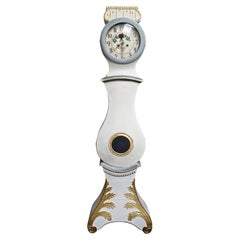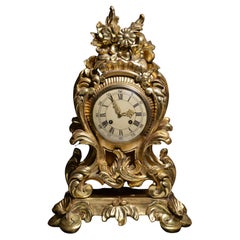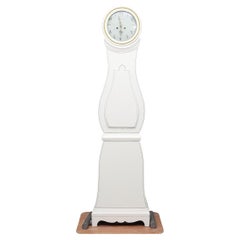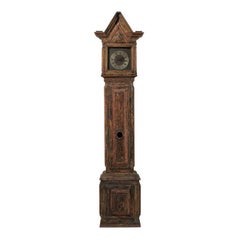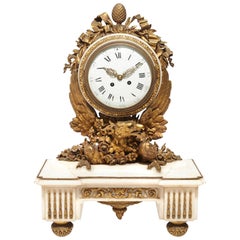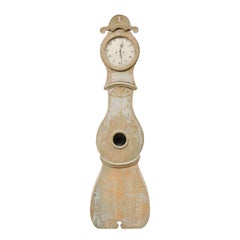Carved Clocks
to
59
314
10
46
205
63
10
26
23
9
4
1
5
1
4
4
4
36
34
19
15
12
12
12
10
6
3
3
2
2
1
1
223
189
85
76
73
174
135
297
96
69
68
39
Height
to
Width
to
324
316
316
8
8
6
3
2
Technique: Carved
Swedish Mora Clock Antique White RosesFryksdall Carved Hood Detail, Early 1800s
Located in Lewes, England
Shipping special update - We have negotiated a special flat rate shipping cost to the USA with our main US shipping partner for our 1st dibs clients of only £995 export crated by ai...
Category
Early 19th Century Swedish Early Victorian Antique Carved Clocks
Materials
Pine
$2,971 Sale Price
65% Off
Swedish Clock by Westerstand Carved Gilt Wood Rococo Style mid 20th century
Located in Sweden, SE
Gorgeous 25 inches (!) tall hand carved and gold leaf floral motive Rococo clock made in 1 copy ca 1950 by Westerstrand or Westerstrand Urfabrik Aktiebolag, one of Töreboda's oldest ...
Category
Mid-20th Century Swedish Rococo Carved Clocks
Materials
Gold, Brass
Swedish Antique Mora Clock White Early 1800s Carved Detail 203cm
Located in Lewes, England
Shipping special update - We have negotiated a special flat rate shipping cost to the USA with our main US shipping partner for our 1st dibs clients of only £995 export crated by ai...
Category
Early 19th Century Swedish Early Victorian Antique Carved Clocks
Materials
Pine
$2,518 Sale Price
36% Off
18th C. Swedish Wood Clock with Linear Profile and Triangular Crest
Located in Atlanta, GA
An 18th century Swedish clock. This Swedish wooden clock with linear profile a square head topped with a triangular shape crest. This clock...
Category
18th Century Swedish Antique Carved Clocks
Materials
Wood
French Ormolu Marble Mantel Clock, 19th Century
Located in Cypress, CA
Spectacular and unique French Napoleon III ormolu mounted white marble mantel clock, 19th century.
The clock is surmounted by a gilt bronze pineapple finial with ribbons over a porcelain clock face with Roman Numerals enclosed into an ormolu egg...
Category
19th Century French Louis XVI Antique Carved Clocks
Materials
Marble, Bronze
19th Century Northern Swedish Painted Wood Floor Clock with Unique Crest
Located in Atlanta, GA
A 19th century Northern Swedish clock an exaggerated bonnet/crest. This handsome Swedish clock is very special, it was obtained in Northern Sweden and features a distinct and uniquely adorn crest, which we lovingly refer to as "Napoleon" as we find it reminiscent of a bircorn (a two-cornered/horned twill military hat). The crest is further designed in a ridged pattern, with a pierced keyhole or escutcheon at it's center. There is a carved fan motif about the neck, with molded accents above and accentuating the waist. This nicely curved clock, rests on a mostly flat base with a pair of petite star carved scrolls at it's center. This clock has an old scraped finish with traces of greyish/ blue/green tones showing throughout.
This clock would be a wonderful decorative object. Though it retains it's original face and movement, it is not currently in working condition, but can be quartzed to keep perfect time, for an additional cost. A quartz battery would then be added behind the face. The original hands are too heavy to carry the quartz movement, so they would be changed to black hands, similar in style. The clock would then chime (the chime can be turned off even though the sound is quite delightful. A pendulum selected to work with the quartz movement would be added behind the glass opening. This Swedish 1820s Fryksdahl clock with lions...
Category
19th Century Swedish Antique Carved Clocks
Materials
Metal
18th Century Louis XVI Period Figurative Bisque Clock
Located in Vancouver, British Columbia
A late 18th century French Louis XVI bisque shepherdess mantel clock. The tableau modelled in bisque porcelain (unglazed porcelain), showing a shepherdess on the left holding her sho...
Category
Late 18th Century French Louis XVI Antique Carved Clocks
Materials
Marble
$4,875 Sale Price
25% Off
Pair of 18th century Italian Clock and Barometer
Located in Los Angeles, CA
Pair of 18th century Italian carved wood fragments with clock and barometer.
Category
18th Century Irish Antique Carved Clocks
Materials
Giltwood
$7,500 / set
18th Century French Louis XVI Carved Giltwood Wall Clock with Oval Painting
Located in Dallas, TX
This large wall hanging clock was carved in Paris, France, circa 1780. The antique clock is topped with a cartouche frame. Inside the frame, is a small, delicate painting decorated w...
Category
Late 18th Century French Louis XVI Antique Carved Clocks
Materials
Mercury Glass, Giltwood
19th Century Swedish Painted Wood Floor Clock, Soft with Minimal Embellishments
Located in Atlanta, GA
A 19th century Swedish floor clock. This antique clock from Sweden is simple and unassuming with it's round-shaped head, minimally adorn with a curved top crest, an elongated neck mo...
Category
19th Century Swedish Gustavian Antique Carved Clocks
Materials
Metal
Victorian Antique Oak Cased Wall Clock by Lund & Blockley of London
By Lund & Blockley
Located in Devon, GB
A fine quality antique, Victorian oak cased wall timepiece by this well-known clockmaking partnership. The substantial circular solid oak case has a surround to the dial, exceptional...
Category
1870s British Victorian Antique Carved Clocks
Materials
Oak
Antique Bronze n Marble Classic Revival Clock by Claude Hemon early 19th century
By Claude Hemon
Located in Sweden, SE
Monumental timepiece in Neoclassical style decorated with fine bronze crater vase on the top of the marble Stella. Clock was produced by renown maker of early 19th century Claude Hém...
Category
Early 19th Century French Neoclassical Antique Carved Clocks
Materials
Marble, Brass, Bronze
Empire Bronze and Sienna Marble Clock with a bust of Apollo Belvedere
Located in Vancouver, British Columbia
A fine example of a French Empire period mantle clock, circa 1830. The rectangular stepped case is made of yellow Sienna marble and is decorated on the top and bottom with patinated ...
Category
Early 19th Century French Empire Antique Carved Clocks
Materials
Siena Marble, Bronze
French 19th Century Cherub clock set, by Deniere, Paris
Located in Brighton, Sussex
An enchanting and very good quality French 19th Century grey marble and gilded ormolu clock garniture, each piece with a patinated bronze cherub seated hold candle sticks either side...
Category
19th Century French Antique Carved Clocks
Materials
Marble, Bronze, Ormolu
St. Bernard Black Forest Mantle Clock
Located in Coeur d'Alene, ID
Antique Black Forest carved mantle clock having two St. Bernard rescue dogs. One with bell and blanket standing with one foot raised on top of cloth, the other with keg sitting next ...
Category
Late 19th Century Antique Carved Clocks
Materials
Wood
Swiss Hand-Carved Black Forest Game Clock
Located in Coeur d'Alene, ID
19th Century Black Forest carved game clock with grouse finial. Featuring grouse resting on detailed forest floor scene with small pine trees, foliage, and mushrooms. With a very dark stain and white roman numerals on clock face. Completely restored and in working condition. Circa 1890. 17" x 7" x 19"
Family Owned & Operated
Cisco’s Gallery deals in the rare, exceptional, and one-of-a-kind pieces that define the history of America...
Category
Late 19th Century Swiss Antique Carved Clocks
Materials
Wood
STUNNING CHINESE EXPORT HAND CARVED WOOD DRAGON MANTLE CLOCK & CANDLESTiCKS
Located in West Sussex, Pulborough
Royal House Antiques
Royal House Antiques is delighted to offer for sale this stunning circa 1880-1920 Chinese Export hand carved dragon mantle clock with matching candlesticks
A good looking and expertly carved suite...
Category
19th Century Chinese Chinese Export Antique Carved Clocks
Materials
Wood
French Empire Style Mantel Clock, circa 1820
Located in Brighton, Sussex
A very impressive and stylish early 19th Century gilded ormolu and green marble mantle clock, having two classical maidens either side feeding Rams, an Eagle above the circular white...
Category
Early 19th Century French Empire Antique Carved Clocks
Materials
Marble, Ormolu
Art Deco Period Table Clock
By Mersman
Located in Los Angeles, CA
A stylish, large, looping table clock from Swiss maker, Mersmann. The rectangular time piece reading "8 Days" and "Swiss", at the bottom center of the Roman numeral, hour designation...
Category
1920s Swiss Vintage Carved Clocks
Materials
Onyx
Second Empire Bronze and Marble Mantel Clock
Located in Montreal, QC
This fine French clock, in an arched verde antico marble case, is set with a bas relief panel depicting Homer. The declaiming blind poet carries his lyre, a young boy leading him. It...
Category
1860s French Empire Revival Antique Carved Clocks
Materials
Marble, Bronze
Pair Louis XVI Style Candelabra, 19th Century
Located in Brighton, Sussex
A good quality pair of French gilded ormolu and rouge marble candelabra, depicting two putti each supporting a two branch candelabra.
Category
1860s French Louis XVI Antique Carved Clocks
Materials
Marble, Bronze
$5,103 / set
Late 19th Century French Doré Bronze Clock
Located in Los Angeles, CA
Late 19th century French finely chased doré bronze clock with cherub and fountain motif.
Category
Late 19th Century French Antique Carved Clocks
Materials
Bronze
Impressive Antique Austrian Champlevé Enamel, Silver-Gilt and Lapis Lazuli Clock
Located in London, GB
Impressive antique Austrian champlevé enamel, silver-gilt and lapis lazuli clock set
Austrian, Late 19th century
Clock: Height 91cm, width 37cm, depth 37cm
Candelabra: Height 64cm, width 24cm, depth 24cm
Clock case: Height 97cm, width 44cm, depth 41cm
Candelabra case: 67cm, width 27cm, depth 27cm
Crafted in Austria in the late 19th century, this magnificent three-piece clock set was most likely gifted to the Imperial Russian family by the Austro-Hungarian Royal family. Its design is inspired by various cultures and styles, whilst its high quality celebrates some of the best craftsmen of the late 19th century.
Of a tiered pagoda shape, the clock is surmounted by an eagle, its wings spread wide landing atop a vibrant lapis lazuli ball. The eagle is most likely a reference to Turul, a mythological animal which is a symbol of Hungary. This bird of prey is also a popular feature within Turkish traditions.
Within a canopy, supported on four sturdy lapis lazuli pillars two prominent silver-gilt bells are hanging. These are carved with various motifs such as acanthus leaf design and connect to the clock mechanism below. The bells ring informing its users of the time.
All four sides of the piece are inset with a clock, an unusual feature on an object of this type and a testament to its highest quality. The inclusion of clocks on all sides signifies that the antique is aimed to be a centrepiece, admired from all sides. The dial is decorated using the champlevé enamelling technique, whereby ‘parcels’ are carved into the silver gilt and into which enamel is poured. The 12 numbers are coloured in black with a gold outline and are surrounded by a white circular background making them stand out and easy to read. The hour clock dial is cast in the form of a sun, while the minute hand is represented as the moon. The two motifs symbolise one’s bright and gloomy sides of existence.
The four corners around the clocks are mounted with three-dimensional female figures dressed in traditional garments from around the world. For example, one figure is dressed in typical Turkish clothing...
Category
Late 19th Century Austrian Antique Carved Clocks
Materials
Lapis Lazuli, Silver, Bronze, Enamel
Unusual Pair of Gustavian Corner Clock Cabinets, Origin Mora, Sweden, Circa 1780
Located in New York, NY
Unusual pair of Gustavian corner clock cabinets, origin: Mora, Sweden, circa 1780
Each cabinet with matching working, tall case clocks decorated with four fluted diamond patterns an...
Category
18th Century Swedish Gustavian Antique Carved Clocks
Materials
Wood, Paint
Recently Viewed
View AllMore Ways To Browse
Arts And Crafts Copper Clock
Cercle Tournants
Chariot Clock
Egyptian Revival Sphinx Mantel Clock
Empire Clock Large
Empire Portico Clock
Four Glass Clock
French Charpentier Clock
Gold Clock Blue
Green Mantel Clock
Key Wind Clock
Louis Picard
Pendulum Clock Gilt Bronze
Pillar Clock
Used Street Clocks
Westminster Chime Clock
American Antique Mantel Clocks
Antique Novelty Clocks
